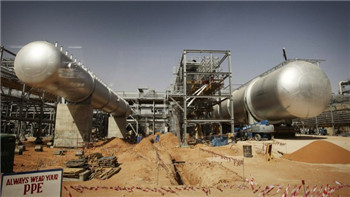(单词翻译:单击)

The Saudis blinked. The latest deal — an agreement with Russia to cap oil output at January levels if they are joined by other large producers — will not rebalance the oil market immediately. The surge in prices last week was premature. But they blinked and that is all important. The myth of Saudi power is broken.
沙特人“眨眼”了。最新的协议——与俄罗斯谈妥,如果其他产油大国配合,将把石油产量冻结在1月水平——将不会立即实现石油市场的再平衡。上周的油价飙升来得太早了。但他们眨眼了,那是极其重要的。沙特实力的神话被打破了。
The real steps necessary to rebalance the market are yet to come. Saudi production must come down. Others may join in the process but a reduction of 3m barrels a day is necessary and most of that will have to come from Saudi Arabia. Stocks must be run off. That will take time. Iran must be welcomed back into the market. That process will be slow and even estimates that Iran can pump another 400,000 barrels a day this year look high. But Iran will come back eventually and need to be accommodated. The interests of other Opec member states, such as Venezuela and Algeria, must also be taken into account. The Saudis’ lack of respect for their fellow Opec producers over the past year has shaken many traditional alliances. The kingdom does not have that many allies.
推动石油市场再平衡的真正措施尚未出现。沙特产量必须降下来。其他产油国或许会加入减产行列,但每日产量减少300万桶是必要的,其中大部分减产将不得不由沙特承担。库存必须被消耗掉。那将需要时间。必须欢迎伊朗回到市场。这个过程将是缓慢的,即使今年伊朗每天再向市场增加40万桶供应的估计看来也偏高。但伊朗终将恢复产油大国地位,需要给它留出空间。还必须考虑其他欧佩克(OPEC)成员国(比如委内瑞拉和阿尔及利亚)的利益。过去一年里,沙特人对欧佩克其他产油国不够尊重,这已动摇了该国的许多传统联盟。沙特王国目前的盟友并不多。
China’s economic slowdown does not help, nor does austerity in Europe. But recessions end, and the combination of the coming elections in France and Germany, plus the disruptive impact of the migration crisis, should lead to more expansionist economic policies.
无论是中国经济减速,还是欧洲实行紧缩,都于事无补。但经济衰退总会结束,而法国和德国将要迎来的大选加上移民危机的破坏性影响,应该会催生更多扩张性的经济政策。
Even if Saudis blink again and cut production on a serious scale there are so many downward pressures that it is hard, short of a revolution in Riyadh, to see prices rising above $50 for three years or even more. Beyond that, potential supply growth still looks stronger than the likely growth in demand.
即便沙特人再次“眨眼”,进行实质性减产,但市场下行压力这么多,除非利雅得爆发革命,否则我们在未来3年乃至更久将看不到油价升至每桶50美元上方。展望更遥远的未来,潜在的供应增量看来仍高于可能的需求增量。
Within Saudi Arabia, the political implications of what has happened over the past week are not yet clear. The change of policy is a humiliation for Ali al-Naimi, oil minister. Power has shifted, although it is not yet clear who the winners will be.
在沙特阿拉伯内部,过去一周事态变化的政治影响尚不明朗。此次改变政策让该国石油部长阿里纳伊米(Ali Al-Naimi)蒙羞。实力已发生转移,尽管目前还看不出谁将成为赢家。
More important for the long term is the shift of power in the oil market. The Saudis were not able to force the US shale industry out of business. The pain has been considerable, especially to the services sector but in the end the companies were able to cut costs in the US and elsewhere. The industry has had two bad years but it is still standing.
长远来看更重要的是石油市场的实力转移。沙特未能迫使美国页岩业破产。痛苦是巨大的,尤其是在油田服务业,但到最后,美国和其他地区的公司都想方设法削减成本。石油行业度过了难熬的两年,但仍屹立不倒。
Market forces are certainly winners from the shift of power. Future prices will be set by the balance of supply and demand, not by decisions taken by any one producer or group of producers. There are multiple sources of supply with no sense of scarcity because technology is opening so many new opportunities. Of these, the most important is the potential growth of oil produced from shale rock.
市场力量肯定是这种实力转移的赢家。未来的油价将取决于供需平衡,而不是哪一个产油国或产油国集团作出的决策。由于科技发展开启了这么多新机遇,目前供应来源非常多,不存在短缺问题。当然,最重要的石油增产潜能来自页岩。
On the other side of the market, demand is flattening out, with growth slowing even in the emerging markets. The latest figures show that Chinese demand in December fell year on year. Across the world demand continues to creep up but the pace is much slower than it was and total consumption may well never reach 100mbd.
在市场另一端,随着新兴市场增长放缓,需求正逐渐趋缓。最新数据显示,去年12月中国需求出现同比下降。从全球范围看,需求在继续缓慢增加,但增速比以往放慢很多,每日总消耗量很可能永远达不到1亿桶。
The balance of supply and demand will set the price, forcing producers to respond by cutting output if the price falls below their comfort level. That prospect is limited, however, by the inability of most producers to tolerate cuts in production for long. Almost all the oil-exporting nations need to maximise their output and trade to remain solvent. They are trapped and must take any price they can get. Wise producers will begin the long-postponed process of economic diversification. There are signs that the Saudis are doing that. Russia, Nigeria, Venezuela and others still seem incapable of change.
供需平衡将决定价格,迫使产油国在油价跌破其舒适水平后减产。然而,这一前景是有限的,因为大多数产油国根本承受不了持续减产。几乎所有石油出口国都需要维持最大产量和出口量,才能保持偿付能力。它们陷入了困境,无论什么价格都得接受。明智的产油国将启动拖延已久的经济多元化进程。目前有一些迹象表明沙特在这么做。俄罗斯、尼日利亚和委内瑞拉等产油国看来仍无力推行改革。
The lesson of the past two years is that in an open global economy no one can defy the power of market forces for long. For the Saudis, the acceptance of the limits of their power must be very painful. They will not be the last to find that they cannot defy economic gravity.
过去两年的教训是,在开放的全球经济中,谁也不能长久地抗拒市场力量的威力。对沙特而言,接受自己实力的局限肯定非常痛苦。沙特将不是最后一个发现自己无法抗拒经济重力的国家。
The writer is visiting professor and chair of the Kings Policy Institute at Kings College
本文作者是伦敦大学国王学院(King’s College London)国王政策研究所(King's Policy Institute)访问教授兼主席


